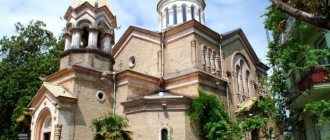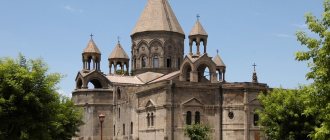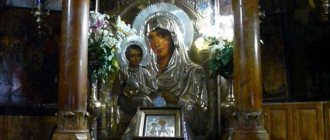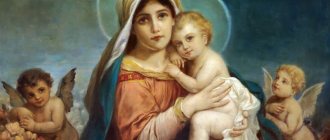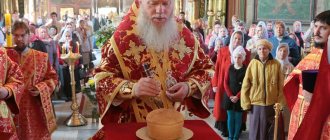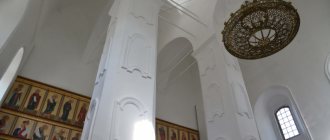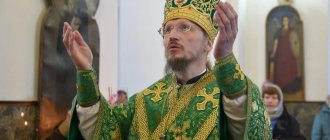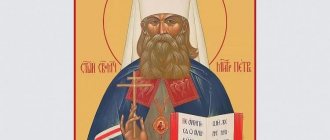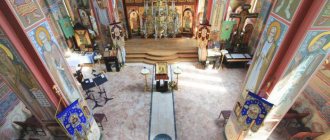Orthodoxy and peace
“We do not have a pedagogy for further growth in Christ; a person, leaving his new leadership, leaves the Church.” What to do about it? Report by Abbot Peter (Meshcherinov) at the conference in memory of Archpriest Alexander Men.
Hegumen Peter (Meshcherinov)
education
He graduated from the music school at the Moscow Conservatory, then the orchestral department of the P. I. Tchaikovsky Conservatory[1].
In 1985-1987 he served in the army.
Then he worked in the Moscow Art Theater Orchestra. Chekhov with Oleg Efremov and in the orchestra of the Great Hall of the Conservatory.
In 1992 he entered the Moscow Theological Seminary.
Since 1992, he has been actively involved in teaching and educational activities. Gives lectures, speaks at various seminars, conferences, and educational readings.
In 1996 he graduated from the Moscow Theological Seminary in absentia.
In 2014, he entered the master's program at the St. Petersburg Theological Academy, from which he graduated in 2022.
Public activities
Pyotr Meshcherinov is known for his appearances on radio and television, as well as articles in the press, both ecclesiastical and secular. He often gives lectures at a variety of educational institutions. Participates in seminars, conferences, and helps organize round tables on issues related to church topics.
Interesting! Abbot Peter devotes a lot of time and effort to working with the younger generation. The main goal of his activities in this area is the formation of an Orthodox youth environment where young people will communicate with each other.
Until 2009, Abbot Peter held the position of deputy head of the CDRM (center for the spiritual development of children and youth) at the monastery. Here he supervised the educational department and the school of youth ministry.
hierarchy
In his own words, Bach’s music led him to Christianity, and reading the philosopher Vladimir Solovyov pushed him to accept baptism in the Orthodox Church. What led to the idea of monasticism was Dostoevsky’s phrase that serving God does not just mean going to mass[2]
In 1990-1991 he was an altar boy in the Church of the Icon of the Sign of the Mother of God near the Rizhskaya metro station. Then he passed various obediences at the St. Daniel Monastery - as a regent, a guide, a bell ringer, and an assistant to the dean.
In 1992, he took monastic vows and was ordained a hierodeacon.
In 1993 he was ordained hieromonk.
In 1995, he was appointed rector of the Danilov Monastery in the village. Dolmatovo (Moscow region).
In 2003 he was elevated to the rank of abbot.
Church life of the Danilov Monastery
The abbot of the St. Danilov stauropegic monastery in Moscow is Archimandrite Alexy (Polikarpov).
Archimandrite Alexy (Polikarpov), abbot of the St. Danilov Stavropegic Monastery in Moscow.
According to the rules of the Danilov Monastery, it is a communal monastery: common prayer, work and meals for the monks. Worship services take place daily. The brethren of the monastery are engaged in charity and mercy in medical and children's institutions, in places of detention, and teach in secular and religious higher educational institutions. The monastery operates a Sunday school, catechetical courses for adults, the Danilovsky Blagovestnik publishing house, an excursion service, and various workshops. The monastery has courtyards: in the Ryazan region, in the Moscow region and the Church of St. Nicholas in Izmailovo.
The monastery has 7 churches with chapels. The main and ancient churches are the Trinity Cathedral and the Church of the Holy Fathers of the Seven Ecumenical Councils.
Moscow, Danilovsky Monastery.
Address of the Danilovsky Monastery
115191, Russia, Moscow, st. Danilovsky Val, building 22. Telephone 8 (only on weekdays).
You can get to the Danilovsky Monastery by metro or tram
At the Tulskaya metro station, get off towards the last car from the center. Coming out of the metro, turn back and walk to the tram tracks. Then, turning right, go straight to the monastery.
From the Paveletskaya metro station to the Svyato-Danilov Monastery stop you can take any tram.
From 6 am to 9 pm the monastery is open to visitors.
There is no hotel in the monastery, so there is no way to accommodate pilgrims.
Divine services of the Danilovsky Monastery are held daily
Divine services are held:
- in the Church of the Holy Fathers of the Seven Ecumenical Councils from Monday to Friday;
- in the Church of the Holy Fathers of the Seven Ecumenical Councils and in the Trinity Cathedral on Saturday and Sunday.
By leaving a comment, you accept the user agreement
quotes
Bach, Bach's music, brought me to Christianity. She has always attracted me with her depth, with what stands behind her. It was in German that I first read the gospel lines - in Bach's Passion. I was prompted to accept baptism in the Orthodox Church by reading Vladimir Solovyov. And then Dostoevsky’s maximalist thought stuck with me: that serving God does not just mean going to mass. So I went to the monastery. This is how I have lived in it for almost twenty years.
We can remember the year 2010, when there was a discussion in the Church about the community of Father Georgy Kochetkov and the methods of his catechesis. Then it turned out that it was not the actual methods of solving problems that Father George proposed that were denied, but the problems themselves. But we have not gotten away from them, they have remained to this day - this is insufficient catechesis, and much more. The real church answer, in my opinion, should be like this: “Father George offered his own version of solving the problems; we criticize him for such and such reasons, and offer our own version (and practical experience) of solving these same problems,” and not “throw our hats at” Father George and shout that everything is fine with us and everything is normal (I I remember at the “Unity of the Church” conference it was said that everything was fine with us, but the evil Father George appeared, who “muddies the waters”).
events
- XIV International Christmas educational readings (January 30, 2006)
- Challenges of the time and ways of development of church life (round table) (June 21, 2006)
- Church and children (round table) (November 9, 2006)
- Preparation for Holy Communion (round table) (December 27, 2006)
- Family in the modern church (round table) (April 26, 2007)
- 1st international conference “Spiritual heritage of Metropolitan Anthony of Sourozh” (September 28, 2007)
- Theology of Communication (conference) (October 22, 2010)
- RSHD Congress, 2010 (November 5, 2010)
- Life in Christ: Christian morality, the ascetic tradition of the Church and the challenges of the modern era (conference) (November 15, 2010)
- Theology of joy in the light of the heritage of Rev. Alexandra Shmeman (seminar) (November 26, 2010)
- Church – Theanthropic Society (conference) (September 23, 2011)
- The legacy of the Reformation in the context of inter-Christian dialogue (conference) (October 13, 2017)
Leave the circle of initial external churching
So, answering our question (since we pose it this way) - where can we find a spiritual heritage in order to creatively create our today's life according to its model - it is worth, in my opinion, paying attention to the 18th century, and without closing our eyes to the church-canonical shortcomings of this era and certain methods of unlawful church-state actions (caused by Caesar-papism), to adopt a lot of living and useful things from this period of the existence of our own church tradition. Let us note here the most important things to pay attention to:
1) reliance on Holy Scripture;
2) reducing the role of external ritualism and teaching, which makes it possible to identify the true churchliness of Christ in the everyday life of Christians;
3) creative adoption of certain features of Western spirituality and the Western structure of church life.
An important clarification needs to be made here. When I talk about such adoption, I do not mean at all the modern spiritual and church life of the Western world . Her assessment goes beyond the scope of my report; suffice it to say that if we have not yet come to many things that have been thought out and lived by Western Christians, then most people in the Western world have already moved on, left these things behind; no one, not even the most ardent Westerner, will deny that, as a whole, the “first world” today is post-Christian. In my opinion, it would be worth creatively adopting the experience of early Protestantism; I would put the Great French Revolution as the time limit here.
And here it is necessary to indicate the context of such adoption. It is determined by the main, in my opinion, problem of our church life today, about which I have already spoken and written a lot - the problem of “de-churching” . This is an unfortunate term, but for lack of a better one we will use it. What does this mean?
By “de-churching” I understand the following phenomenon: the currently existing church didactics offers people entering the Church a certain pedagogy of external churching. Over time, it is exhausted - from the Gospel it is obvious that Christian life is a process of constant internal growth (Matthew 13: 31; 33) - and “matured” Christians no longer are nourished by external rituals and the external church subculture they have adopted.
But we do not have a pedagogy for further, so to speak, “post-new” growth in Christianity; it has not been developed (not in ancient monastic books, but in general pastoral methodology).
The norm of churching in our country is becoming the norm of all Christian life, which obviously does not correspond to the true meaning of the Church as an institution, the purpose of which is to lead a person further and more fully into life with Christ and in Christ. Not receiving such a life and year after year walking in the circle of initial external churching, people eventually become convinced of the futility of this and leave this circle.
The tragedy here is that, since we do not have a pedagogy for further growth in Christ, a person, leaving his novice, leaves the Church, and sometimes Christ Himself - because in his novice churchliness he actually did not receive the true experience of life in Christ .
Photo: VK/Simbirsk Metropolis
pathological speech
change of world view
- (Healing from “neophyteism” occurs) “through some obligatory internal (and sometimes external) crisis, through an indispensable, painful revaluation of
, let’s say,
external values
” [3].
ideology of a besieged fortress
Loyalty to the ideology of the besieged fortress
However, protection alone will not be able to solve the missionary tasks of the Church and raise its authority[4].
The Holy Fathers do not have thought forms
- Many problems of worship, pastoral care and clergy, youth work, and social service have not been resolved[5].
- The Church did not pass a conciliar condemnation on either Catholics or Protestants; the issue of the boundaries of the Church and other ecclesiological problems were not at all resolved by the Church[6].
pathological speech techniques
approximation
Secularization... in my opinion, is a providential action of God (So! - Ed.) due to the fact that the Church failed to cope with something, with some task, so God (So! - Ed.) handed it over to something external to the church, namely, say, the action of the Enlightenment and secularization[7].
lowercase letter instead of uppercase
The words “God”, “God’s” with a lowercase letter[7].
Biblical allusion
- The Sabbath is for man, not man for the Sabbath.
pathological vocabulary
Absolutize, Absolutizing, Abstraction, Automatic, Actual, Anti-Americanism, Antinomic, Anti-Christian, Apolitical, Apolitical, Atomized, Atomized, Atomize, Atomize, Bureaucratic, Variability, Intercommunication, Byzantine, Byzantine, Byzantine, Influence, Influence, External, External, Inner life , Reproduction, Eastern Churches, Universality, Comprehensive, Whole, Guarantee, Deepest, Humanism, Detailed, Disciplinary-ideological, Disciplinary, Dogmatism, Doctrinal, Spirituality, Spiritual foundations, Eucharistic, Cheerful, Programmed, Thought-provoking, Frozen, Sophisticated, Imperial, Impulse, Inertial, Inertia, Intention, Intimate, Extreme, Falsely humble, Personal, Personality, Magism, Maximum, Metaphysical, Mechanical, Monastic ideal, Obscurantism, Orientation, Nationalistic, Inadequacy, Uninteresting, Uninteresting, Irreducible, Renewal, Ritualism, Obscurantism, Community , Community, Obligation, One-sided, On behalf of the Church, Churchify, Humanize, Paradigmatic, Paradoxical, Paternalism, Repentant, Political, Complete, Rule, Habitual, Call, Pseudo-ascetic, Slave, Joy, Joy of Being, Disunity, Flourishing, Realizing, Regulation, Reduction, Reducing, Ritual, Ritualism, Rituality, Ritual, Routine, Routine, Sacred, In itself, Self-worth, Free personality, Free, Peculiar, Soviet, Solidarity, Co-creation, Means, Subculture, Subculturality, Schematically, Tragic, Traditional values, Dejected, Dejected, Dejection, Jingoistic, Jingoistic, Strengthening, Effort, Formal, Sanctified, Preachy, Temple, Christianity, Purpose, Churchiness, Civilizational, Chauvinistic, Ecclesiology, Entropy, Language
keywords
- life
- Church
- Human
- God
- I
- Church
- Christ
- Love
- Lord
- heart
- soul
- spiritual
- Today
- Spirit
- Scripture
- grace
- God's
- thing
- word
- time
essays
- Peter (Meshcherinov), Fr.
Conversations about faith and church. - M.: Danilovsky blagovestnik (GUP IPK Ulyan. House of Printing), 2004. - 278 p. - Peter (Meshcherinov), Fr.
About some of our mistakes: [daily missionary work, teaching or studying?, are we afraid of freedom, respecting our children]. - Moscow: Danilov Monastery, “Danilovsky Blagovestnik”, 2007. - 44 p. — (Invitation to dialogue). — ISBN 978-5-89101-222-6. - Peter (Meshcherinov), Fr.
Church and modernity: questions and answers. - Moscow ; Kyiv: Orthodox Book Center, 2008. - 271 p. — ISBN 978-966-96814-6-1. - Peter (Meshcherinov), Fr.
The sacrament of repentance: preparation and confession.
- M.: Publishing house. Council of the Russian Orthodox Church (Ulyanovsk: Ulyanovsk Press House), 2006. - 44 p. — ISBN 5-94625-145-7. Peter (Meshcherinov), Fr.
The sacrament of repentance: preparation and confession. - M.: Publishing house. Council of the Russian Orthodox Church, 2008. - 45 p. — ISBN 5-94625-145-7. - Peter (Meshcherinov), Fr.
The sacrament of repentance: preparation and confession. - M.: Publishing house. Moscow Patriarchate, 2009. - 42 p. — ISBN 5-94625-145-7.
Taste the cup of life... About the necessity for a true Christian of constant communion of the Holy Mysteries of Christ. - Moscow ; Kyiv: Orthodox Book Center, 2008. - ISBN 978-966-96814-4-7.
- Peter (Meshcherinov), abbot, Bozhenov A.V.
Taste the cup of life... About the necessity for a true Christian of constant communion of the Holy Mysteries of Christ. - M.: QUO VADIS, 2010. - 96 p. — ISBN 458717787877.
About talent and the meaning of life. What is the secret of giftedness? — Danilovsky Blagovestnik, 2009.
Problems of churching. — Quo Vadis, 2010. — 160 p. — ISBN 978-966-96814-3-0.
Life in the Church: the experience of catechetical presentation. - M.: Lepta Book, 2011. - 364 p. — (Fundamentals of the Orthodox worldview, Spiritual conversations: the practice of Orthodox piety). — ISBN 978-5-91173-262-2.
Life in the church: about our faith. - M., 2022. - 346 p. - (Orthodox Library). — 3,000 copies. — ISBN 978-5-699-94926-7.
The beginning and formation of European music: [12+]. - M.: Ripol classic: Pangloss, 2022. - 299 p. — (Lectures PRO. History of music). — ISBN 978-5-386-12297-3.
translations
- Johann Sebastian Bach.
Texts of spiritual works / Transl. Peter (Meshcherinov), father.. - M.: Center book. Rudomino, 2012. - 590 p. — ISBN 978-5-905626-37-1. - Texts of spiritual works: all the creations of the great master / Transl. Peter (Meshcherinov), o.. - 2nd, rev.. - M.: Eksmo, 2014. - 590 p. : ill., portrait p. — ISBN 978-5-699-73475-7.
- Johann Arndt - About true Christianity: [16+] / Trans. Peter (Meshcherinov), o.. - M.: E, 2016. - 1001, [1] p. : ill. — (Treasury of World Christianity).
- Valentin Weigel
Selected works (translation) / Trans. Peter (Meshcherinov), father.. - M.: Rudomino Book Center, 2016. - Gerhard Terstegen - The Path of Truth: [16+] / translation from German by Abbot Peter (Meshcherinov). - M.: Eksmo, 2022. - 488, [1] p. — (Treasury of World Christianity). — 2000 copies. — ISBN 978-5-699-95132-1.
Four theological academies, the rise of monasticism and the growing influence of the Church
Johann Arndt
“Getting rid of preconceived opinions” did not at all mean a rejection of the patristic Tradition; and this meant the abolition of superficial reprimand, characteristic of the churchliness of Moscow Rus'. This line was also expressed in practice - in the well-known struggle of Peter I against all “hype.” This obvious influence of the Reformation led, of course, to a certain retreat into the background, a “subsidence” (so to speak) of ecclesiology. But, in my opinion, then this was a positive phenomenon: after the hypertrophied growth of external churchism, which led to a schism and prompted Peter I to reform the Church, such a “swing of the pendulum” in the other direction was perhaps even necessary.
The second most important influence of the Reformation, after the system of spiritual education, was spiritual edifying literature. I will not talk about this in detail; this is the topic of a separate report. Everyone knows the influence of Johann Arndt's pre-pietist book on St. Tikhon of Zadonsky - and not only on him. According to Arndt, all segments of the Russian population learned the beginnings of spiritual life - from Emperor Paul I to ordinary peasants (we find them among the subscribers to one of the reprints of Arndt’s book).
Less known, but by no means less significant, is the influence on St. Philaret of the Moscow quietist Francois Fenelon (quietism is a mainly Catholic phenomenon, but very close in spirit to the Reformation, which is why quietism was ultimately condemned by the Roman Catholic Church). The educated strata of Russian society read both Pietist and quietist literature; the first - in the originals, and the second at the end of the 18th - first quarter of the 19th century was translated quite en masse, and even on the instructions of the Chief Prosecutor of the Holy Synod, Prince. Golitsyn was sent to monasteries (works by Madame Guyon).
How to evaluate this Westernization, this reformation and near-reformation (represented by quietism) influence on the Russian Church? Today, under the influence of increasingly “unwinding” anti-Westernism, a general superficial assessment of this phenomenon, of course, will be extremely negative. But the Gospel teaches us to look at the fruits. You will recognize them by their fruits (Matthew 7:20).
The fruits of this Westernization are Saints Tikhon of Zadonsk and Philaret of Moscow (Arndt and Fenelon did not harm them at all), a student of the Kyiv theological schools, Saint Theophan the Recluse (who translated the quietist Francis de Sales) and a whole host of educated, enlightened and at the same time completely Orthodox clergy.
These are (by the beginning of the 20th century) four theological academies. This, as I have already said, is the flowering of Russian monasticism; this is, after all, the influence of the Russian Church - which has become the most educated and creatively active of all Orthodox churches - both on world Orthodoxy (the Balkans) and on mission among non-Christian peoples (the Japanese and Chinese Churches).

